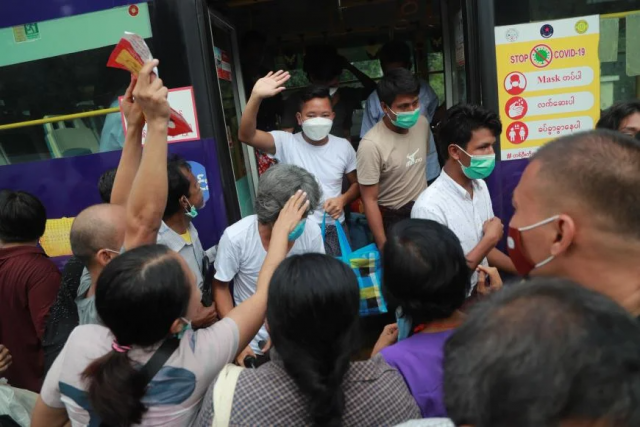Myanmar: Prisoner Releases Fall Short
21 October 2021


Released detainees wave from a bus after Myanmar announced a prisoner release, Tuesday, October 19, 2021. © AP Photo
Deposed Political Leaders and Journalists Remain Detained
(Bangkok) – The Myanmar junta’s recent prisoner releases are limited in scope and do not reflect a broader change in the military’s respect for human rights, Human Rights Watch said today. On October 18, 2021, the State Administrative Council junta announced that it was pardoning 1,316 people and dropping charges against 4,320 who “participated in protests.” The junta provided no details about the terms of the releases or how they were being carried out.
Concerned governments should increase pressure on the junta to release all political prisoners, end abuses against protesters and others, and commit to promptly restore democratic rule.
“The partial release of wrongfully held detainees should not distract from the junta’s egregiously abusive rule, which hasn’t changed,” said Linda Lakhdhir, Asia legal adviser at Human Rights Watch. “Some of those released have already been rearrested. The junta should release all those unjustly held since the coup, including high-profile political figures, and end all arbitrary arrests.”
The junta did not provide a list of those being released or their locations. As of October 19, the Assistance Association for Political Prisoners (AAPP), a local nongovernmental organization that has documented arrests, prosecutions, and releases since the February 1 coup, had only been able to confirm the release of 189 prisoners, including 14 journalists. Several of those released have reported torture and other ill-treatment in detention.
The junta’s announcement suggests that the authorities are dropping charges of “incitement” under Section 505A of Myanmar’s Penal Code, a vague new law promulgated by the junta to punish comments critical of the coup or the military government. However, many of those charged with incitement are facing other charges as well and may continue to be detained on those charges.
Eleven of the 38 people released in the city of Meiktila, including a National League for Democracy member of parliament, were rearrested immediately after their release and are now facing possible charges under Myanmar’s Counter-Terrorism Law. The authorities are also requiring all those released to promise not to participate in further anti-coup activities, in violation of their basic rights. A military spokesman warned that anyone rearrested would serve the remainder of their original sentence in addition to any new sentence.
The AAPP reported that while the junta claimed to have released over 2,000 prisoners in June, they were only able to verify the release of 372.
“The authorities’ lack of transparency and immediate rearrest of some released prisoners reinforce the need to keep the pressure on to release all political prisoners,” Lakhdhir said. “As with the prisoner release in June, the actual numbers released may prove to be far lower than claimed.”
In the eight months since the coup, the junta has arrested more than 9,000 people, with more than 7,100 still in detention as of October 19, the AAPP said. Nearly 2,000 more are known to be evading junta arrest warrants. Those still detained include the senior leadership of the National League for Democracy, including its de facto leader Aung San Suu Kyi, the deposed president Win Myint, elected members of parliament, and dozens of journalists. Security forces made at least 24 new arrests on the same day the junta announced the prisoner releases.
Since the coup, the junta has committed widespread and systematic abuses against the civilian population that amount to crimes against humanity, including murder, enforced disappearance, torture, rape and other sexual violence, severe deprivation of liberty, and other inhumane acts causing great suffering. Many of those detained have said that security personnel tortured and otherwise ill-treated them and others in custody. Methods of torture reported include beatings, mock executions with guns, burning with cigarettes, and rape and threatened rape. Security forces have killed at least 1,181 people, including some who appear to have been tortured to death in detention.
Concerned governments should impose tougher economic measures against the military, its leadership, and its vast business activities to cut off the military’s sources of foreign revenue, most of which are kept outside of Myanmar in foreign banks. The United Nations Security Council should impose a global arms embargo on Myanmar.
“Governments should not mistake these releases as a sign that the junta is taking a new approach,” Lakhdhir said. “Instead, the releases appear to be a cynical gesture to blunt growing international pressure to sanction the junta and its generals.”
Announcements
28 February 2025
Asian NGO Network on National Human Rights Institutions , CSO Working Group on Independent National Human Rights Institution (Burma/Myanmar)
Open letter: Removal of the membership of the dis-accredited Myanmar National Human Rights Commission from the Southeast Asia National Human Rights Institution Forum

Progressive Voice is a participatory rights-based policy research and advocacy organization rooted in civil society, that maintains strong networks and relationships with grassroots organizations and community-based organizations throughout Myanmar. It acts as a bridge to the international community and international policymakers by amplifying voices from the ground, and advocating for a rights-based policy narrative.